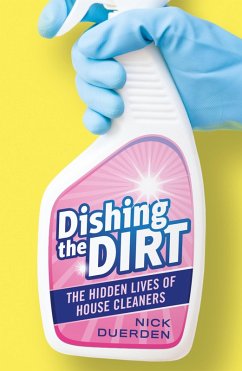Prologue. Clocking On
It was as if she were invisible, like she wasn't even there. Or, perhaps more accurately, like she didn't really count, not in any tangible sense, this mostly silent domestic cleaner with the broken English whose back was perpetually stooped over the vacuum cleaner, the dustpan and brush, the damp mop; someone who likely knew her way around the utility room better than the homeowners themselves.
Today, the wife was away on business, as she frequently was, but the husband wasn't here alone. The marital bed was not empty.
'A different woman,' she says. 'Younger.'
And he didn't hide this from you, wasn't embarrassed, ashamed of parading his affair so brazenly under your nose?
She shakes her head, and smiles tightly. 'No,' she says. 'No.'
She was seemingly in his confidence, then, but not through any prior agreement, a finger to the side of the nose, and nor was he paying her for her silence, her implicit complicity. 'I don't think he even considered me,' she says. 'Or my reaction.' She was merely part of the furniture, a once-weekly presence in the house who mutely got on with her work as she always did, over three floors, three bedrooms and two bathrooms: the vacuuming, the polishing, the dusting.
She had a name, Boglarka, and she was Hungarian, mid-thirties, here in London a couple of years now, almost fluent but shy with it. She had a bank account, a bike, an Oyster card; she flat-shared in one of the outer boroughs, and diligently sent money back home each month via PayPal. The wife knew her name, though would, like everyone else here, struggle with its hard consonants, but the husband offered no suggestion that he did. 'Hello' and 'goodbye' had been the full extent of their communications since her work here had begun a full year previously.
Right now, she picked up the clothes that had been discarded, pre-coitally the night before, on the bedroom carpet, disposed of the used prophylactic, and focused on the post-coital bed once she-the other woman-had at last got up to join the husband downstairs in the kitchen. More traces of the previous night's indiscretion were then dutifully wiped clean, the bed stripped, the sheets bundled into the washing machine, which she set to 60 degrees before pressing START. She cleaned the en-suite, the shower stall, and scrubbed the toilet bowl, which bore evidence of repeated use and little care and attention on the days she didn't come to clean. She hung his crumpled suit jacket back in the wardrobe, and liberated the clothes dryer of its smalls, his and his absent wife's, replacing them gently, respectfully even, in their appropriate drawers, his and hers, on either side of the matrimonial bed. The photograph of the both of them on their wedding day, confetti in their hair, sat in its usual position on the chest of drawers. She dusted it now, as she always did.
Working from the top of the house to the bottom, opening windows under the eaves in the attic and disturbing the dust, which took to the air and danced in a column of sunlight, she used Cif and Harpic, Domestos and Windolene, her rubber gloves slick with chemicals, her fingers inside clammy with sweat. Often, she was down on her hands and knees, because he liked the carpet beneath the bed swept, the floorboards underneath the sofa, too. Here, she found balls of fluff, probably the cat's, and curling sweet wrappers; she found odd socks, a random shoe whose lowheeled counterpart, she presumed, was secreted elsewhere in the house but not yet stumbled across. A bra: the wife's, or the other woman's?
If the bathroom had been reliably messy, the kitchen was worse. The kitchen was always worse. Woks and frying pans meant grease splattered north east south and west, the cupboards alongside the hob, the dust-encrusted extractor fan above. Mr Muscle Kitchen Cleaner, and lots of it. Plates were piled high in the sink, mugs with days-old tidemarks. A scouring pad somewhere beneath.
Next to the microwave, the coffee that he had made for her, that he made for her every Wednesday morning at 8 o'clock, was cooling, first ignored, then ultimately forgotten, coffee that she would, after he had departed for work, pour slowly down the sink in favour of the tall glass of water she needed to slake her mounting thirst.
She steered clear of the kitchen for now, taking her time in the living room, with its bookshelves, mantelpiece trinkets, the multiple picture frames, the Venetian blinds. She loitered here longer because they were still at the kitchen table, sharing a leisurely breakfast, her legs draped proprietorially over his. He had made her something complicated with eggs (his usual breakfast was a banana and slice of toast), and both of them would be late for work. From where she was in the lounge, deliberately not eavesdropping but overhearing everything anyway, she could make out kisses, lovers' giggles. She coughed loudly, deliberately. The ruse worked. The man looked over at the wall clock, noting the time. Shoes on, jackets, briefcase and handbag. Car keys. The front door opened, then slammed shut. Gone, leaving nothing but trails of aftershave and perfume in their wake.
She would likely never see this woman again, and next Wednesday the wife would be back in place, this woman to whom Boglarka would have to smile in greeting while maintaining an awkward silence, siding with the husband when, had she been given the choice, the option, she'd much rather have sympathised with the wife. But this was a line she was unable to cross, the ghost in the house who saw no evil, nor spoke it. Her presence in this soap opera might have been front row, but it was not her place to applaud or jeer.
But then, as she had long ago learned, this was an unwritten part of her job description. A domestic cleaner sees many things on any given day during the cleaning of houses; she-and more often than not it is a woman-tells no one. Or almost no one. She tells her fellow cleaners. Cleaners have much gossip to share, and plenty of war stories. And so while she sees everything, and sometimes bears the brunt of her employers' casual cruelties, she keeps shtum. She simply gets on with the task at hand, because there is always more work to do. Dirt has a habit of reproducing. Always more dirt, always more to clean.
Boglarka has also learned that while she would prefer to have a full grasp of English, some employers would like her tongue to remain semi-skilled. When one is not fluent in the language of the host country, her flatmates have explained, a barrier remains between employer and employee-a notable distance. The hierarchy is observed. Non-linguists can feel inhibited in such situations, so perhaps this is one reason why so many are employed in London today. Homeowners like the conviction that they are above, and cleaners below. The less likely cleaners are to answer back, the more the social order is maintained. In this way, our domestic help will keep themselves to themselves, and focus solely, and silently, on the task at hand. In this way, each can ignore the other's existence more easily, if not entirely, the physical presence of either party receding into a fuzzy background.
But our cleaners do take notice. Naturally and reflexively, they are cultural anthropologists. They hold the key to our real identities, to the people we really are, behind closed doors.
***
Domestic help, now so common, such a factor of everyday life, was once a comparative rarity in the UK, the preserve of the upper classes, those who lived upstairs and employed those who dwelt downstairs. By the early 1900s, the middle classes had begun to enjoy the benefits of cleaners, too, not merely because they also craved tidy homes that they did not have to toil over, but because employing domestic staff had become an indicator of status. The average cleaning lady was a cleaning girl, still a teenager and likely uneducated, and therefore eminently affordable; the pay was low-1p an hour was not untypical-and they often worked 16-hour days. Food and board was included, but the food the servant ate was far inferior to the food they cooked and served their employers, and they often slept in basements, or up in draughty attics, occasionally in the kitchen itself. They were extended few courtesies, and expected to never step out of line. Punishment could be harsh if they did. They had no rights, no public voice. They were second-class citizens working as slave labour, but without them residences would fall into abject disarray. Underappreciated as they were, their presence in so many of the nation's households was essential.
After World War Two, and the introduction of the welfare state in 1948, money was scarce and demand for cleaners evaporated. Throughout the 1950s and beyond, they became, once again, largely the preserve of the wealthy.
But the 1980s saw another shift. Increasingly, both husbands and wives were now required to go out to work, to pursue careers. This left little time for domestic upkeep, and if wives- traditionally the housekeepers-were too tired to vacuum after a long day at the office, their husbands were unlikely to step into the breach. Two salaries brought financial security, and so once again we looked to others to clean up after us. The gig economy duly materialised, and previously out-of-work women began to advertise themselves as cleaners. They brought their friends with them, their mothers and daughters. There was no shortage of willing char ladies. They advertised in the windows of local newsagents, and relied upon word-of-mouth. Business grew.
A generation on, cleaners began utilising the internet. Now anyone can find one at the click of a mouse, and many of us have done just that. Type 'cleaners London' into a search engine, and over 39 million results come up.
The 21st Century has seen further change to how we manage our daily lives. Increasingly, we are willing to delegate more, specifically to pay others to do the work we'd rather not do ourselves, even if we cannot really afford it. A wave of cheap immigrant labour entered the UK between 2000 and 2020, especially from the new EU member states in eastern Europe. Better to pay a Magda from Poland, say, £30 a week to run the Hoover around the house for a few hours than to save the money for a rainy day. This of course plays into Magda's fortunes directly, and what the profession has lost in status, it has gained in popularity. Careers can be made in cleaning now, and entrepreneurial types have rushed to set up their own businesses in what has become a booming market. Magda, meanwhile, has WhatsApped her friends back home telling of the ready work available here, and her friends, none of them workshy, have come in their droves.
One in four households today with an annual income of under £20,000 still finds the money to pay for a cleaner. Nationwide, the industry is worth some £26 billion a year. Research commissioned by the insurance company esure suggests that the under 35s are most likely to have a cleaner on a weekly basis, millennials intent on getting the most out of their downtime in a way that, by comparison, their parents never did, and never could. If there used to be a certain stigma, a lingering sense of class guilt, about employing another human being to tidy up after you when you could tidy up yourself, there isn't any more. The younger generation has grown up learning that cleaning is something one simply doesn't do for oneself. Others can do that kind of thing for you.
We might still feel secretly awkward about this. In the words of the writer and poet Kate Clanchy, who wrote a book, Antigona and Me, in 2009 about the improbable relationship she had with her own cleaner, a refugee from Kosovo:
'It's about class, and oppression. Even if you think of yourself as this nice, liberal person, you are still representative of the leading class, especially to those you employ. The truth is, every white person in this country is sustained by three or four brown people, and that can be embarrassing to us for all sorts of reasons.'
If it is increasingly true that more and more of our cleaners are coming from overseas-and this is nowhere more true than in London, immigrants invariably fated to do the jobs shunned by natives-then there is another, more revealing, reason why. Those who come from Poland, from Bulgaria and Romania, from the Philippines and Indonesia, tend often to be university educated. Back home, they were white-collar professionals. They had status. But they were forced to leave their countries because they could no longer afford to live, or provide for their families, on the wages they earned, even in decent jobs. Inflation was crippling. In Bulgaria, for example, electricity bills rose month on month-up to 40 per cent during the years 2017/18-which sent even fairly well-paid careerists plunging towards the breadline. So they left their breaking, and broken, countries, and travelled abroad in pursuit of that most covet-able of things: a living wage. They came to the UK, and they came to London, where the capital is full of domiciles that need cleaning, and owners impatient to employ someone to oversee the whole messy business. Many such homeowners found themselves more comfortable taking on someone from Romania than from Romford.
'If you employ a British person to clean your house, they are likely to be working class,' says one former cleaner-turned-businesswoman from Bulgaria's capital, Sofia. 'Many have studied, just like you have, to get a British education, but unlike you, they still end up a cleaner, and this is for them a low status job. So they might resent you. And you, the employer, might see this resentment, and feel it. It's a class issue, I think. It makes people uncomfortable. But if you employ someone from overseas, someone like me, then you have an educated person cleaning your house, middle-class just like you. So they are the same as you, you might say. With an English cleaner, perhaps not so much. That's the difference. And it's a big difference.' A recent survey undertaken by Bark, a hiring website, revealed that the areas of the UK that saw the highest employment of domestic cleaners included places like Oxford, Cambridge, Reading and York; London was ranked number one. The cities that employed the fewest, and so were deemed the 'dirtiest,' were Aberdeen, Manchester, Norwich and Leeds. The 'cleanest' boroughs in London were Kensington, Westminster, Richmond, Hammersmith and Fulham, and Camden.
Without their cleaners, householders would be living in filth. Or else many of us would, like our parents before us, have to spend several evenings and most of Saturday tidying up after ourselves, always the most onerous task of the working week, and the most mundane. The idea of divorce can take root in such monotony.
Those that clean for Londoners are a silent army. They bring order to our lives, they put out the bins, and relieve us of at least some of the myriad pressures of modern life. They are privy to our indiscretions, our peculiarities, our curious habits. They put up with us, which isn't always easy because some of us are complicated souls.
But who are the members of these well-drilled regiments? What are their stories? Do they know that we talk about them when we are among ourselves-at dinner parties, at coffee mornings, at the school gates-and how much do we care that they, too, talk about us? If we are the prism through which they view their host nation, what conclusions do they draw? Do we make for decent employers, fair and kind, perhaps even generous? And if we are sometimes cruel, and talk down at them, why do we do that? Do we treat them fairly-or are they being taken advantage of?
If we asked them, what would they say?
It was as if she were invisible, like she wasn't even there. Or, perhaps more accurately, like she didn't really count, not in any tangible sense, this mostly silent domestic cleaner with the broken English whose back was perpetually stooped over the vacuum cleaner, the dustpan and brush, the damp mop; someone who likely knew her way around the utility room better than the homeowners themselves.
Today, the wife was away on business, as she frequently was, but the husband wasn't here alone. The marital bed was not empty.
'A different woman,' she says. 'Younger.'
And he didn't hide this from you, wasn't embarrassed, ashamed of parading his affair so brazenly under your nose?
She shakes her head, and smiles tightly. 'No,' she says. 'No.'
She was seemingly in his confidence, then, but not through any prior agreement, a finger to the side of the nose, and nor was he paying her for her silence, her implicit complicity. 'I don't think he even considered me,' she says. 'Or my reaction.' She was merely part of the furniture, a once-weekly presence in the house who mutely got on with her work as she always did, over three floors, three bedrooms and two bathrooms: the vacuuming, the polishing, the dusting.
She had a name, Boglarka, and she was Hungarian, mid-thirties, here in London a couple of years now, almost fluent but shy with it. She had a bank account, a bike, an Oyster card; she flat-shared in one of the outer boroughs, and diligently sent money back home each month via PayPal. The wife knew her name, though would, like everyone else here, struggle with its hard consonants, but the husband offered no suggestion that he did. 'Hello' and 'goodbye' had been the full extent of their communications since her work here had begun a full year previously.
Right now, she picked up the clothes that had been discarded, pre-coitally the night before, on the bedroom carpet, disposed of the used prophylactic, and focused on the post-coital bed once she-the other woman-had at last got up to join the husband downstairs in the kitchen. More traces of the previous night's indiscretion were then dutifully wiped clean, the bed stripped, the sheets bundled into the washing machine, which she set to 60 degrees before pressing START. She cleaned the en-suite, the shower stall, and scrubbed the toilet bowl, which bore evidence of repeated use and little care and attention on the days she didn't come to clean. She hung his crumpled suit jacket back in the wardrobe, and liberated the clothes dryer of its smalls, his and his absent wife's, replacing them gently, respectfully even, in their appropriate drawers, his and hers, on either side of the matrimonial bed. The photograph of the both of them on their wedding day, confetti in their hair, sat in its usual position on the chest of drawers. She dusted it now, as she always did.
Working from the top of the house to the bottom, opening windows under the eaves in the attic and disturbing the dust, which took to the air and danced in a column of sunlight, she used Cif and Harpic, Domestos and Windolene, her rubber gloves slick with chemicals, her fingers inside clammy with sweat. Often, she was down on her hands and knees, because he liked the carpet beneath the bed swept, the floorboards underneath the sofa, too. Here, she found balls of fluff, probably the cat's, and curling sweet wrappers; she found odd socks, a random shoe whose lowheeled counterpart, she presumed, was secreted elsewhere in the house but not yet stumbled across. A bra: the wife's, or the other woman's?
If the bathroom had been reliably messy, the kitchen was worse. The kitchen was always worse. Woks and frying pans meant grease splattered north east south and west, the cupboards alongside the hob, the dust-encrusted extractor fan above. Mr Muscle Kitchen Cleaner, and lots of it. Plates were piled high in the sink, mugs with days-old tidemarks. A scouring pad somewhere beneath.
Next to the microwave, the coffee that he had made for her, that he made for her every Wednesday morning at 8 o'clock, was cooling, first ignored, then ultimately forgotten, coffee that she would, after he had departed for work, pour slowly down the sink in favour of the tall glass of water she needed to slake her mounting thirst.
She steered clear of the kitchen for now, taking her time in the living room, with its bookshelves, mantelpiece trinkets, the multiple picture frames, the Venetian blinds. She loitered here longer because they were still at the kitchen table, sharing a leisurely breakfast, her legs draped proprietorially over his. He had made her something complicated with eggs (his usual breakfast was a banana and slice of toast), and both of them would be late for work. From where she was in the lounge, deliberately not eavesdropping but overhearing everything anyway, she could make out kisses, lovers' giggles. She coughed loudly, deliberately. The ruse worked. The man looked over at the wall clock, noting the time. Shoes on, jackets, briefcase and handbag. Car keys. The front door opened, then slammed shut. Gone, leaving nothing but trails of aftershave and perfume in their wake.
She would likely never see this woman again, and next Wednesday the wife would be back in place, this woman to whom Boglarka would have to smile in greeting while maintaining an awkward silence, siding with the husband when, had she been given the choice, the option, she'd much rather have sympathised with the wife. But this was a line she was unable to cross, the ghost in the house who saw no evil, nor spoke it. Her presence in this soap opera might have been front row, but it was not her place to applaud or jeer.
But then, as she had long ago learned, this was an unwritten part of her job description. A domestic cleaner sees many things on any given day during the cleaning of houses; she-and more often than not it is a woman-tells no one. Or almost no one. She tells her fellow cleaners. Cleaners have much gossip to share, and plenty of war stories. And so while she sees everything, and sometimes bears the brunt of her employers' casual cruelties, she keeps shtum. She simply gets on with the task at hand, because there is always more work to do. Dirt has a habit of reproducing. Always more dirt, always more to clean.
Boglarka has also learned that while she would prefer to have a full grasp of English, some employers would like her tongue to remain semi-skilled. When one is not fluent in the language of the host country, her flatmates have explained, a barrier remains between employer and employee-a notable distance. The hierarchy is observed. Non-linguists can feel inhibited in such situations, so perhaps this is one reason why so many are employed in London today. Homeowners like the conviction that they are above, and cleaners below. The less likely cleaners are to answer back, the more the social order is maintained. In this way, our domestic help will keep themselves to themselves, and focus solely, and silently, on the task at hand. In this way, each can ignore the other's existence more easily, if not entirely, the physical presence of either party receding into a fuzzy background.
But our cleaners do take notice. Naturally and reflexively, they are cultural anthropologists. They hold the key to our real identities, to the people we really are, behind closed doors.
***
Domestic help, now so common, such a factor of everyday life, was once a comparative rarity in the UK, the preserve of the upper classes, those who lived upstairs and employed those who dwelt downstairs. By the early 1900s, the middle classes had begun to enjoy the benefits of cleaners, too, not merely because they also craved tidy homes that they did not have to toil over, but because employing domestic staff had become an indicator of status. The average cleaning lady was a cleaning girl, still a teenager and likely uneducated, and therefore eminently affordable; the pay was low-1p an hour was not untypical-and they often worked 16-hour days. Food and board was included, but the food the servant ate was far inferior to the food they cooked and served their employers, and they often slept in basements, or up in draughty attics, occasionally in the kitchen itself. They were extended few courtesies, and expected to never step out of line. Punishment could be harsh if they did. They had no rights, no public voice. They were second-class citizens working as slave labour, but without them residences would fall into abject disarray. Underappreciated as they were, their presence in so many of the nation's households was essential.
After World War Two, and the introduction of the welfare state in 1948, money was scarce and demand for cleaners evaporated. Throughout the 1950s and beyond, they became, once again, largely the preserve of the wealthy.
But the 1980s saw another shift. Increasingly, both husbands and wives were now required to go out to work, to pursue careers. This left little time for domestic upkeep, and if wives- traditionally the housekeepers-were too tired to vacuum after a long day at the office, their husbands were unlikely to step into the breach. Two salaries brought financial security, and so once again we looked to others to clean up after us. The gig economy duly materialised, and previously out-of-work women began to advertise themselves as cleaners. They brought their friends with them, their mothers and daughters. There was no shortage of willing char ladies. They advertised in the windows of local newsagents, and relied upon word-of-mouth. Business grew.
A generation on, cleaners began utilising the internet. Now anyone can find one at the click of a mouse, and many of us have done just that. Type 'cleaners London' into a search engine, and over 39 million results come up.
The 21st Century has seen further change to how we manage our daily lives. Increasingly, we are willing to delegate more, specifically to pay others to do the work we'd rather not do ourselves, even if we cannot really afford it. A wave of cheap immigrant labour entered the UK between 2000 and 2020, especially from the new EU member states in eastern Europe. Better to pay a Magda from Poland, say, £30 a week to run the Hoover around the house for a few hours than to save the money for a rainy day. This of course plays into Magda's fortunes directly, and what the profession has lost in status, it has gained in popularity. Careers can be made in cleaning now, and entrepreneurial types have rushed to set up their own businesses in what has become a booming market. Magda, meanwhile, has WhatsApped her friends back home telling of the ready work available here, and her friends, none of them workshy, have come in their droves.
One in four households today with an annual income of under £20,000 still finds the money to pay for a cleaner. Nationwide, the industry is worth some £26 billion a year. Research commissioned by the insurance company esure suggests that the under 35s are most likely to have a cleaner on a weekly basis, millennials intent on getting the most out of their downtime in a way that, by comparison, their parents never did, and never could. If there used to be a certain stigma, a lingering sense of class guilt, about employing another human being to tidy up after you when you could tidy up yourself, there isn't any more. The younger generation has grown up learning that cleaning is something one simply doesn't do for oneself. Others can do that kind of thing for you.
We might still feel secretly awkward about this. In the words of the writer and poet Kate Clanchy, who wrote a book, Antigona and Me, in 2009 about the improbable relationship she had with her own cleaner, a refugee from Kosovo:
'It's about class, and oppression. Even if you think of yourself as this nice, liberal person, you are still representative of the leading class, especially to those you employ. The truth is, every white person in this country is sustained by three or four brown people, and that can be embarrassing to us for all sorts of reasons.'
If it is increasingly true that more and more of our cleaners are coming from overseas-and this is nowhere more true than in London, immigrants invariably fated to do the jobs shunned by natives-then there is another, more revealing, reason why. Those who come from Poland, from Bulgaria and Romania, from the Philippines and Indonesia, tend often to be university educated. Back home, they were white-collar professionals. They had status. But they were forced to leave their countries because they could no longer afford to live, or provide for their families, on the wages they earned, even in decent jobs. Inflation was crippling. In Bulgaria, for example, electricity bills rose month on month-up to 40 per cent during the years 2017/18-which sent even fairly well-paid careerists plunging towards the breadline. So they left their breaking, and broken, countries, and travelled abroad in pursuit of that most covet-able of things: a living wage. They came to the UK, and they came to London, where the capital is full of domiciles that need cleaning, and owners impatient to employ someone to oversee the whole messy business. Many such homeowners found themselves more comfortable taking on someone from Romania than from Romford.
'If you employ a British person to clean your house, they are likely to be working class,' says one former cleaner-turned-businesswoman from Bulgaria's capital, Sofia. 'Many have studied, just like you have, to get a British education, but unlike you, they still end up a cleaner, and this is for them a low status job. So they might resent you. And you, the employer, might see this resentment, and feel it. It's a class issue, I think. It makes people uncomfortable. But if you employ someone from overseas, someone like me, then you have an educated person cleaning your house, middle-class just like you. So they are the same as you, you might say. With an English cleaner, perhaps not so much. That's the difference. And it's a big difference.' A recent survey undertaken by Bark, a hiring website, revealed that the areas of the UK that saw the highest employment of domestic cleaners included places like Oxford, Cambridge, Reading and York; London was ranked number one. The cities that employed the fewest, and so were deemed the 'dirtiest,' were Aberdeen, Manchester, Norwich and Leeds. The 'cleanest' boroughs in London were Kensington, Westminster, Richmond, Hammersmith and Fulham, and Camden.
Without their cleaners, householders would be living in filth. Or else many of us would, like our parents before us, have to spend several evenings and most of Saturday tidying up after ourselves, always the most onerous task of the working week, and the most mundane. The idea of divorce can take root in such monotony.
Those that clean for Londoners are a silent army. They bring order to our lives, they put out the bins, and relieve us of at least some of the myriad pressures of modern life. They are privy to our indiscretions, our peculiarities, our curious habits. They put up with us, which isn't always easy because some of us are complicated souls.
But who are the members of these well-drilled regiments? What are their stories? Do they know that we talk about them when we are among ourselves-at dinner parties, at coffee mornings, at the school gates-and how much do we care that they, too, talk about us? If we are the prism through which they view their host nation, what conclusions do they draw? Do we make for decent employers, fair and kind, perhaps even generous? And if we are sometimes cruel, and talk down at them, why do we do that? Do we treat them fairly-or are they being taken advantage of?
If we asked them, what would they say?
Dieser Download kann aus rechtlichen Gründen nur mit Rechnungsadresse in A, B, BG, CY, CZ, D, DK, EW, E, FIN, F, GR, H, IRL, I, LT, L, LR, M, NL, PL, P, R, S, SLO, SK ausgeliefert werden.
The Guardian review: "Nick Duerden sets out to discover what it is like to clean houses for a living by talking to migrant workers who service the homes of contemporary Londoners. "His eclectic cast of informants belong to this transitory workforce, men and women (but mostly women) who 'hold the key to our real identities, to the people we really are, behind closed doors.' "The result is an elegant portrait of the strained intimacies that grow up between cleaner and employer in 21st-century Britain. "Dishing the Dirt is not a deeply researched tract, nor a tub-thumping polemic about precarious employment. Instead, driving Duerden's inquiry is a fascination for the complex interior lives of people who usually play an off-stage role in our personal dramas. Despite the size of the industry, with perhaps as many as one in three UK households employing a cleaner, the realities of waged domestic labour are little known beyond those who actually do it. "Duerden offers the people who vacuum carpets a chance to speak freely and at length about their hopes and dreams, anxieties and disappointments. It is less an exercise in titillating gossip than a study in what makes all of us painfully human....His book succeeds brilliantly in dismantling casual assumptions about the drudgery of cleaning – and about the kinds of people who do it for a living.' Helen McCarthy, The Guardian, 2020 https://www.theguardian.com/books/2020/oct/15/dishing-the-dirt-by-nick-duerden-review-the-hidden-lives-of-house-cleaners









